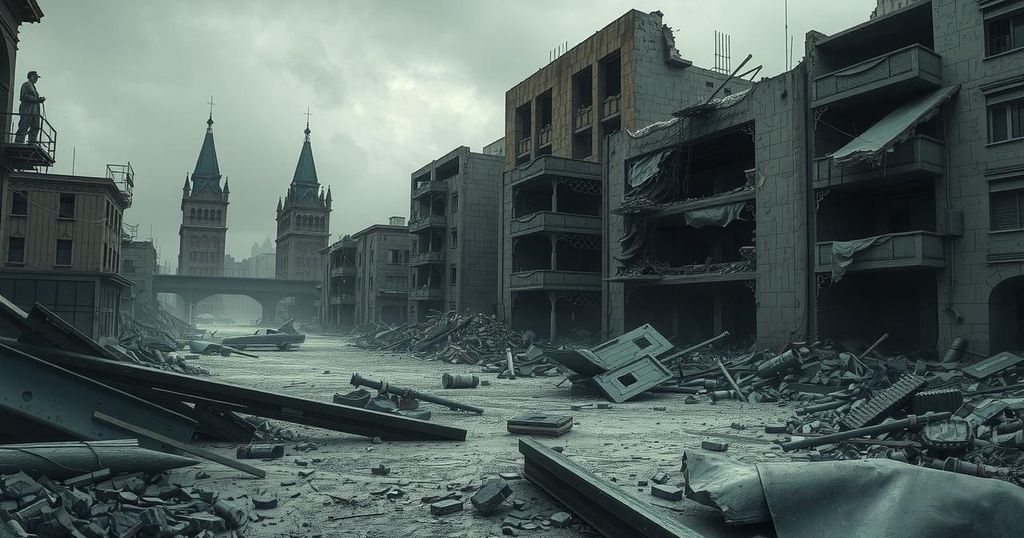The US bombing campaign in Yemen has escalated, resulting in civilian casualties and worsening the humanitarian crisis exacerbated by aid cuts. The campaign targets the Houthi movement, which claims to retaliate against external aggressions. Humanitarian organizations face significant challenges operating within the conflict, leading to fears of a deepening catastrophe.
The escalation of the United States bombing campaign in Yemen has exacerbated an already bleak humanitarian situation. Reports indicate the ongoing strikes, conducted after President Donald Trump reduced aid, have resulted in civilian casualties and increased uncertainty for the country’s impoverished residents. Siddiq Khan, who leads Islamic Relief’s operations in Yemen, remarked, “Now the rampant bombing has started, you never know which way things will go.”
For over two weeks, US airstrikes have targeted the Houthi movement, which largely controls Yemen amidst ongoing conflict. These bombings are intended to retaliate against Houthi attacks on commercial shipping, which the militants claim are responses to Israeli actions in Gaza. The president emphasized the intense nature of these operations, asserting, “Hell will rain down upon you like nothing you have ever seen before.”
Details of Trump’s military actions surfaced following an incident where a journalist was included in a private chat with senior US officials, revealing discussions of operations. National Security Advisor Mike Waltz noted in the group that they had killed a key Houthi figure, while further emphasizing the US’s commitment to these strikes, leaving concerns over civilian casualties unaddressed.
Strikes have been reported in densely populated areas including the capital Sana’a and the port city of Hodeidah. Niku Jafarnia from Human Rights Watch confirmed that the Houthis have obstructed access to bomb sites and hospitals, complicating assessments of civilian impact. She stated, “There is no question there are civilian casualties.” Reports indicate that civilian infrastructure has been targeted, raising alarms over the potential for extensive civilian harm.
The Houthi-run media has claimed that US forces bombed a cancer hospital and accused them of committing war crimes, resulting in numerous casualties. Monitoring groups like the Yemen Data Project reported that the initial strikes have claimed the lives of at least 25 civilians, including children, and inflicted damage on multiple civilian sites.
Furthermore, Airwars, an investigative group, documented the deaths and injuries of women and children amid the strikes. The United Nations verified the fatalities of two young boys due to the ongoing bombardments. Despite a US defense official stating that assessments suggest no civilian casualties occurred, reports of destroyed homes present a contrasting narrative.
The ongoing violence has crippled Yemen’s economy, leaving millions dependent on assistance. Approximately 19 million of the 36 million residents require aid, particularly women and children. UNICEF reported alarming levels of malnutrition among children under five, and funding for humanitarian efforts remains critically low. Khan indicated that the bombings are undermining an aid sector already facing significant challenges due to earlier cuts in support and legal risks from Houthi designations.
Humanitarian organizations are struggling to navigate legal boundaries while addressing urgent needs amidst the bombing campaign. An anonymous aid worker expressed that the compounded issues hinder their ability to assist those in need, stating staff face numerous challenges and fears about safety. The Houthis have also restricted access for aid efforts, intensifying the ongoing crisis.
In summary, while the US continues military actions without troops, the effectiveness of such strategies has been called into doubt given the Houthis’ endurance through years of conflict. The dire humanitarian crisis remains unaddressed, with fears of further catastrophe looming over the country.
The recent US bombing campaign in Yemen has severely intensified an already critical humanitarian crisis. Civilian casualties and the destruction of vital infrastructure have raised alarm among humanitarian organizations, which are already struggling due to reduced funding and legal constraints. The situation underscores the increasing complexity of delivering aid while navigating a volatile conflict landscape, compounded by ongoing military actions and political decisions. As the humanitarian need grows, the risk of a further disaster in Yemen looms large.
Original Source: www.theguardian.com






